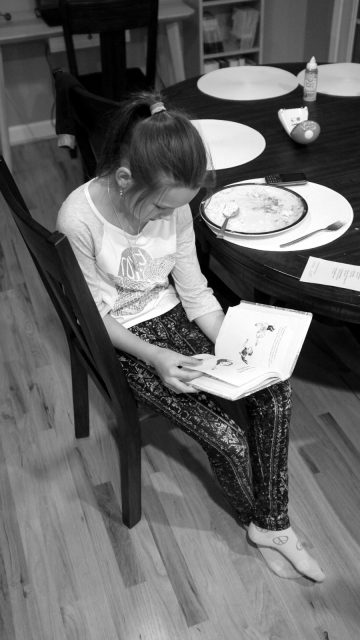The Girl is tough. I don’t mean that she’s resilient, that she can take a metaphorical beating and get up from it. I mean she’s stubborn, so very set in her ways that she looks at me sometimes with a glint in her eye when she’s resisting and I think that if we could just get that stubbornness off of petty things, get it away from food and her obstinate refusal to try anything new, get it away from her irritation with the Boy and her stubborn insistence that everything go her way, get it away from her frustration with little failures and her insistence that the original solution to the problem (the solution that is obviously anything but) is the only solution to the problem — if we could just redirect it, steer it just a bit, give it just the slightest nudge, she would have the resilience of a diamond.

Last night, we sat the table, fighting about food. I insisted that she eat some of the veggies that went alone with the stir fry we had for dinner. I insisted. I insisted. I insisted. And she fought. “I won’t” became “I can’t” became tears of frustration and anger.
I sat thinking whether it was necessary. Am I ruining her culinary tastes, creating a stubbornness for life, by doing this? Is it really a big deal that she doesn’t eat something? Am I making something of nothing?

And then there was the question of disobedience. I can’t have that — it’s pathological. I get it enough from students at school. And yet, who really wants to submit?
And then there was the question of resilience: if I let her get by with not tackling this meager challenge — in the end, it turned out to be five, five bites — what kind of a child am I raising? I want someone who will slay dragons, and she can’t even eat five damn bites of vegetables.

The other day in school, I had a quiet conversation with a very bright young lady who wanted to leave my class because she was so frustrated. She wasn’t frustrated with me, or with my class, or with anyone in the class. But someone had said something, and she was on the warpath. She was ready to swing, as she said.
“But you don’t have to. You can control that.”
“No, I can’t,” she replied. Her tone wasn’t argumentative or plaintive — it was matter-of-fact. “I can’t.”

Of course she can, and I told her that, but to someone who has such a very fatalistic worldview, suggesting that she can control something she’s always been convinced she can’t control was like me suggesting that she could control her digestive system like those tabloid gurus who the tabloid writers excitedly proclaim haven’t had a bowel movement in decades. It makes sense: if you can control your heart rate and breathing, why can’t you control every aspect of your body, including bowel movements and aging. Yet on a practical level, it’s ridiculous to me. That’s likely how this young lady viewed my suggestion that she could simply not fight, that she could unclinch her fists, take a deep breath, and let people say whatever the hell they want to about her.
I don’t think the Girl will ever become anything like that. But perhaps I’m so concerned that she might, even with the little things, that I worry I overreact.

“Tomorrow,” I decided, “I must make better decisions.”
The Democratic party, now, seems to me to be a little like the Girl. It stuck by principles that seemed so important at the time, but in the end, one principle in particular cost them dearly. The principle? That as progressives, they are on the “right side of history,” and to be on the right side of history means to be the party that has the first black president, and what could put them more firmly on the right side of history than to elect the first woman president. And so the party put forward a candidate that was seen by Republicans and many Democrats alike as untrustworthy.

In her hubris, Clinton assumed she would be the Democratic nominee, because that would put the Democrats once again on the “right side of history.” Sanders was not supposed to fight. Sanders was supposed to be on the “right side of history” as well. He got in the way, but the email leak scandal shows that the Democratic party machinery conspired to make sure he got put in his place, white male that he is. When the general election cycle began, Clinton, as the freshly minted historic nominee, knew she and her party were on the “right side of history,” and given Trump’s ridiculous and offensive behavior, it almost seemed poetic that he was the candidate, the perfect ying for her yang. Slate, an openly left-leaning magazine, can finish the argument better than I:
The party establishment made a grievous mistake rallying around Hillary Clinton. It wasn’t just a lack of recent political seasoning. She was a bad candidate, with no message beyond heckling the opposite sideline. She was a total misfit for both the politics of 2016 and the energy of the Democratic Party as currently constituted. She could not escape her baggage, and she must own that failure herself.
Theoretically smart people in the Democratic Party should have known that. And yet they worked giddily to clear the field for her. Every power-hungry young Democrat fresh out of law school, every rising lawmaker, every old friend of the Clintons wanted a piece of the action. This was their ride up the power chain. The whole edifice was hollow, built atop the same unearned sense of inevitability that surrounded Clinton in 2008, and it collapsed, just as it collapsed in 2008, only a little later in the calendar. The voters of the party got taken for a ride by the people who controlled it, the ones who promised they had everything figured out and sneeringly dismissed anyone who suggested otherwise. They promised that Hillary Clinton had a lock on the Electoral College. These people didn’t know what they were talking about, and too many of us in the media thought they did. (Slate)
There are other things at work there, I realize. And this all says nothing about what the political right accomplished in this election. National Review sums that up well:
This is a direct rebuke to progressive hubris. It turns out that the progressive elite’s preoccupations with identity politics, social shaming, and radical sexual change don’t motivate their “coalition of the ascendant.” In the past eight years, the progressive movement has doubled down its attacks on churches and in recent years directly confronted American law enforcement. It has attacked free speech, the free exercise of religion, and gun rights — secure in the belief that history was, as they put it, on their “side.”
The result was clear: The Democratic party lost ground with America’s poorest voters. Citizens making less than $50,000 per year propelled Obama to victory over Romney. Exit polling shows that Trump improved the GOP showing by 16 points with voters making less than $30,000 per year and by six points with voters making between $30,000 and $50,000, which more than offset Democrat gains with the middle class. (National Review)
For the right, this was not about choosing a man over a woman; it was about choosing one ideology over another. The New Republic recognized this as well:
This brings us to the problem of how the Democratic Party—and America as a whole—can recover from this calamity. There is sure to be a civil war among Democrats, with leftists arguing that a purer, less compromised version of liberalism will have a better chance of appealing to those very voters who put Trump over the top. There will be a push to expand the Democratic message beyond the identity politics that has increasingly defined the party in recent years—to welcome with open arms those blue-collar and middle-class whites who have been culturally alienated by newly assertive blue-collar and middle-class workers of brown skin. And there will be a backlash to this, an argument that the Democratic Party’s function is to redress the wrongs that have been done to minorities and make white America atone for its sins—“to force our brothers to see themselves as they are,” as James Baldwin put it, “to cease fleeing from reality and begin to change it.” (New Republic)
In that vein, some liberals suggest that this is just a sign of the latent misogyny and racism in America, but that kind of talk seems to indicate that they haven’t yet learned much from this earthquake. What should they talk away from it? Back to the National Review:
The presidential candidate that voters believe less, like less, and think less qualified won the election. In other words, rather than endure four more years of elite progressive rule, the American people chose to gamble on a reality-television star with well-known and openly notorious character flaws. That’s how much they were ready for change.
It was all about change, Trump supporters say.

In that sense, though, Trump’s supporters are a little like the Girl as well. The Girl tends to see every setback as a complete disaster. So many little things blow up into the end of the world for her. The veggies were an impossible task. We’d asked her to do the impossible, and she just couldn’t do it, couldn’t imagine it. In the same way, many on the right saw the election of Clinton as the end of the country. Obama began the transformation into a socialist republic, they saw, and Clinton would finish it.

Change can be good. It can be scary. These are merely truisms. Yet, change often does work, and so tonight, I changed tactics with the Girl: I put her veggies on a plate and told her that she needed to scarf them down before the Boy, who was napping, and napping hard, woke up. “Then for dinner, all you’ll have is chicken and rice.” She jumped at the chance. A little reframing, a little rewording, and we got reached the same conclusion.
Eventually, the left will realize this and act on it. Frustrated Americans will vote the right out and the left in, until the cycle repeats again.